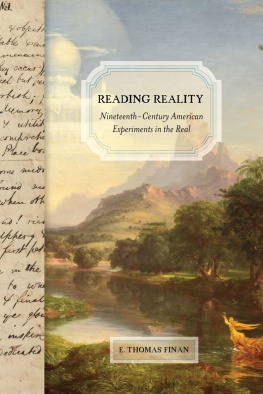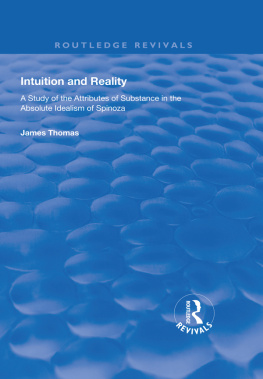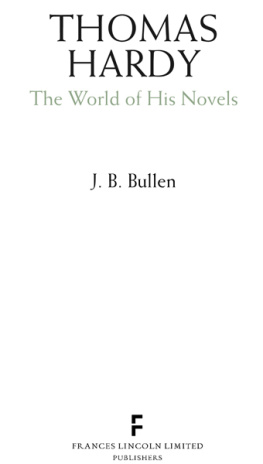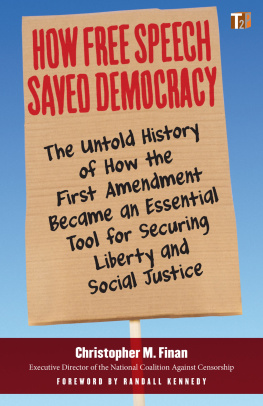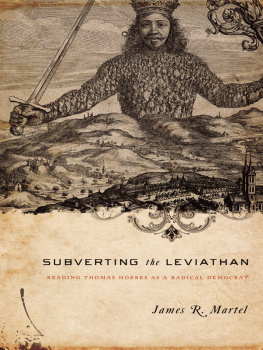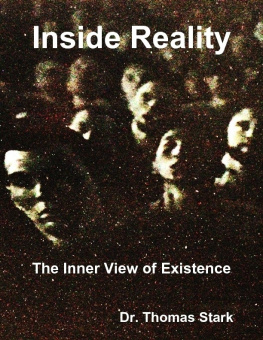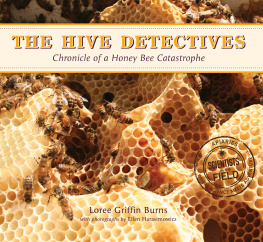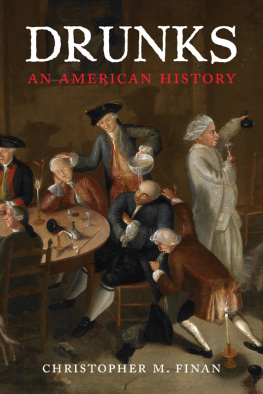E. Thomas Finan - Reading Reality
Here you can read online E. Thomas Finan - Reading Reality full text of the book (entire story) in english for free. Download pdf and epub, get meaning, cover and reviews about this ebook. year: 2020, publisher: Lightning Source Inc. (Tier 3), genre: Romance novel. Description of the work, (preface) as well as reviews are available. Best literature library LitArk.com created for fans of good reading and offers a wide selection of genres:
Romance novel
Science fiction
Adventure
Detective
Science
History
Home and family
Prose
Art
Politics
Computer
Non-fiction
Religion
Business
Children
Humor
Choose a favorite category and find really read worthwhile books. Enjoy immersion in the world of imagination, feel the emotions of the characters or learn something new for yourself, make an fascinating discovery.
- Book:Reading Reality
- Author:
- Publisher:Lightning Source Inc. (Tier 3)
- Genre:
- Year:2020
- Rating:5 / 5
- Favourites:Add to favourites
- Your mark:
- 100
- 1
- 2
- 3
- 4
- 5
Reading Reality: summary, description and annotation
We offer to read an annotation, description, summary or preface (depends on what the author of the book "Reading Reality" wrote himself). If you haven't found the necessary information about the book — write in the comments, we will try to find it.
Reading Reality — read online for free the complete book (whole text) full work
Below is the text of the book, divided by pages. System saving the place of the last page read, allows you to conveniently read the book "Reading Reality" online for free, without having to search again every time where you left off. Put a bookmark, and you can go to the page where you finished reading at any time.
Font size:
Interval:
Bookmark:
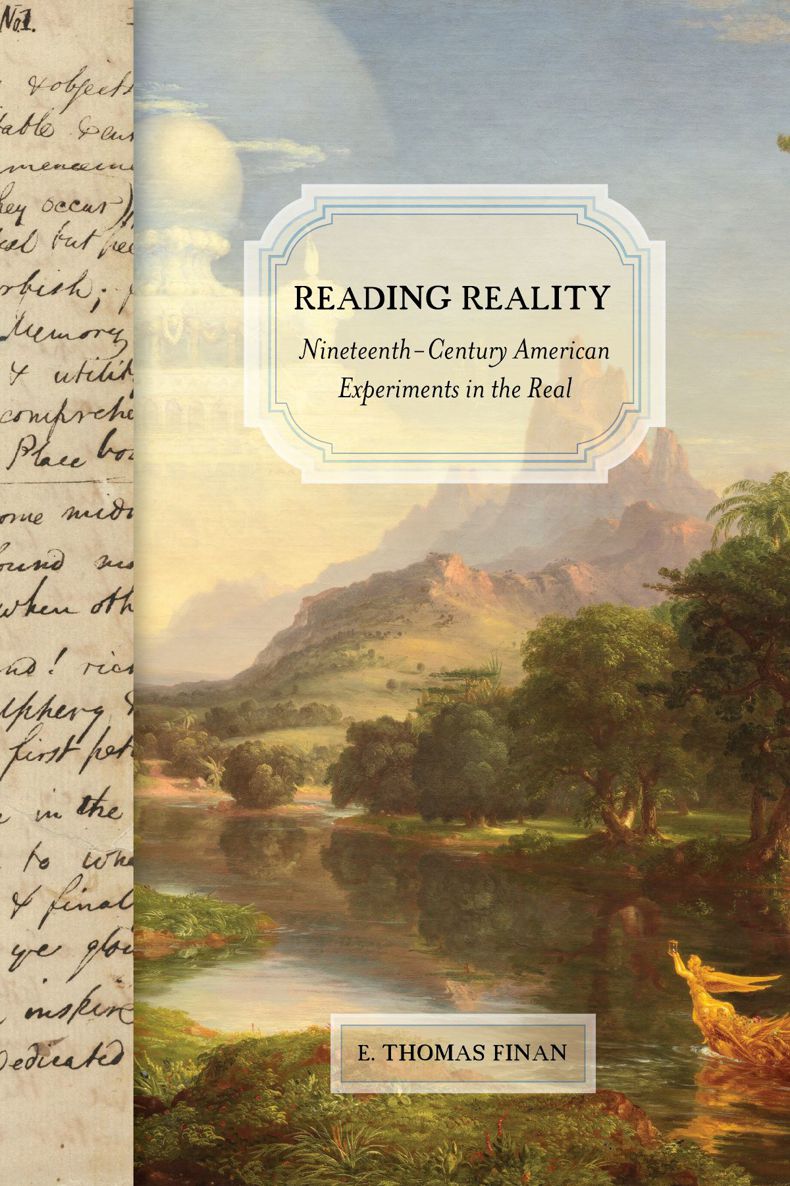
E. Thomas Finan
University of Virginia Press
Charlottesville and London
University of Virginia Press
2021 by E. Thomas Finan
All rights reserved
Printed in the United States of America on acid-free paper
First published 2021
1 3 5 7 9 8 6 4 2
Library of Congress Cataloging-in-Publication Data
Names: Finan, E. Thomas, author.
Title: Reading reality : nineteenth-century American experiments in the real / E. Thomas Finan.
Description: Charlottesville : University of Virginia Press, 2021. | Includes bibliographical references and index.
Identifiers: LCCN 2020033424 (print) | LCCN 2020033425 (ebook) | ISBN 9780813945590 (hardcover) | ISBN 9780813945606 (paperback) | ISBN 9780813945613 (ebook)
Subjects: LCSH: American literature19th centuryHistory and criticism. | Realism in literature. | Reality in literature. | Emerson, Ralph Waldo, 18031882Criticism and interpretation. | Whitman, Walt, 18191892Criticism and interpretation. | Dickinson, Emily, 18301886Criticism and interpretation.
Classification: LCC PS217.R4 F56 2021 (print) | LCC PS217.R4 (ebook) | DDC 810.9/12dc23
LC record available at https://lccn.loc.gov/2020033424
LC ebook record available at https://lccn.loc.gov/2020033425
Cover art:The Voyage of Life: Youth, Thomas Cole, 1842, oil on canvas (Ailsa Mellon Bruce Fund, National Gallery of Art, Washington); manuscript page from The Wide World, Ralph Waldo Emerson, 1820 (MS Am 1280H [2], Ralph Waldo Emerson Memorial Association deposit, Houghton Library, Harvard University)
The very language we speak, thinks for us, by the subtle distinctions which already are marked for us by its words.
Emerson
Let fame, that all hunt after in their lives,
Live registered upon our brazen tombs,
And then grace us in the disgrace of death;
When, spite of cormorant devouring time,
Thendeavour of this present breath may buy
That honour which shall bate his scythes keen edge,
And make us heirs of all eternity.
Ferdinand, King of Navarre
I am fortunate to have taught at Boston Universitys College of General Studies during the composition of this book. Dean Natalie McKnight and her predecessor Linda Wells have provided great personal and scholarly support, for which I am very thankful. Adam Sweeting and Meg Tyler served at various times as chair of the Humanities Division at the College. Their support, encouragement, and advice have been great gifts. My colleagues at CGS have exemplified the spirit of intellectual cooperation that is at the heart of the Colleges mission. I am particularly grateful for the financial support provided by the College and Dean McKnight for the permissions and indexing costs of the book. Under the auspices of Boston Universitys Center for Interdisciplinary Teaching & Learning at the College of General Studies, Bruce Dennis provided helpful research assistance in the later phase of this project. I am very grateful for a publication award from the Boston University Center for the Humanities to support this project.
Portions of this book were delivered at conferences sponsored by the American Comparative Literature Association; the American Literature Association; the Association of Literary Scholars, Critics, and Writers; and the Thoreau Society. A portion of this book was also delivered as a talk at Boston University through the Faculty Research and Scholarship Committee at the College of General Studies. I am grateful to the organizers of these events for the opportunity to present and to the audiences for their useful comments, questions, and suggestions.
A variety of friends and colleagues (two not mutually exclusive categories) read portions or earlier versions of this manuscript: Cheryl Boots, Charles Capper, David Mikics, Cristanne Miller, Allen Speight, Adam Sweeting, and Meg Tyler. I am also grateful for discussions about this project with Marshall Brown, David Dowling, Leslie Eckel, Lucas Fain, Paul Franz, Robert Habich, Daniel Karlin, Wendy Martin, Pat McCarthy, Anita Patterson, John Paul Russo, David Sloane, and others. Kevin P. Van Anglen has been an invaluable scholarly resource, and his comments on drafts for this project have improved it immensely. This book grew out of a dissertation for which Rosanna Warren served as the principal advisor; her incisive commentary, intellectual generosity, and continued support have made this and so much else possible.
At the University of Virginia Press, Eric Brandt proved indispensable in helping this volume through the publication process. Charlie Bailey, Helen Chandler, Morgan Myers, and the rest of the press staff also helped shepherd this book through its production. Leslie Tingles editorial eye did much to improve the text. The anonymous readers commissioned by the press showed great critical care and intellectual charity, and their remarks greatly improved the manuscript.
Research for this book has been assisted by the holdings of Mugar Memorial Library at Boston University; the Houghton Library at Harvard University; the Thomas P. ONeill Jr. Library at Boston College; and the American Antiquarian Society.
My parents and brother have provided support that goes far beyond this book. In the closing days of this project, my wife and I welcomed our first child into the world. To Jenny and Ceciliafor being and for coming to be.
A portion of chapter 4 was originally published as the following article: Captivity Is Consciousness: Consciousness and Its Revisions in Dickinsons Poetry, Emily Dickinson Journal 24, no. 2 (2015): 2445. Copyright 2015 Johns Hopkins University Press. I am grateful to the Emily Dickinson Journal and Johns Hopkins University Press for permission to reproduce it here.
Emily Dickinsons poems are reproduced with permission of the publisher: The Poems of Emily Dickinson: Variorum Edition, edited by Ralph W. Franklin (Cambridge, Mass.: The Belknap Press of Harvard University Press). Copyright 1998 by the President and Fellows of Harvard College. Copyright 1951, 1955 by the President and Fellows of Harvard College. Copyright renewed 1979, 1983 by the President and Fellows of Harvard College. Copyright 1914, 1918, 1919, 1924, 1929, 1930, 1932, 1935, 1937, 1942 by Martha Dickinson Bianchi. Copyright 1952, 1957, 1958, 1963, 1965 by Mary L. Hampson.
An essay in the April 1833 issue of the New-England Magazine declares that poetry is all reality; it deals in reality, and reality alone. Exploring this connection between poetry and reality affords insights into the intellectual debates and literary strategies of nineteenth-century Americans, particularly in the middle third of that century. It also provides a window into the broader enterprise of readingwhat is gained and what is at issue in the experiential encounter with a text.
Many of the authors both inside and outside the conventional literary canon of the antebellum United States were deeply interested in some sense of a metaphysical reality and often saw literature as a place for interrogating experience in the hope of finding reality. The shift from antebellum ideal to the postCivil War real (and Realism) is a standard in American literary studies and a staple of undergraduate surveys. But American writers prior to the Civil War also laid claim to their own sense of the real and often foregrounded the real in their discussions of the literary enterprise, especially poetry.
Font size:
Interval:
Bookmark:
Similar books «Reading Reality»
Look at similar books to Reading Reality. We have selected literature similar in name and meaning in the hope of providing readers with more options to find new, interesting, not yet read works.
Discussion, reviews of the book Reading Reality and just readers' own opinions. Leave your comments, write what you think about the work, its meaning or the main characters. Specify what exactly you liked and what you didn't like, and why you think so.

